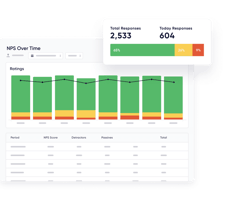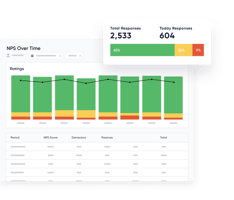How a Net Promoter Score Translates to Small Business Growth
A Net Promoter Score (NPS) is used by businesses in nearly every industry to measure customer loyalty over time — this metric is key when it comes to making potentially important business decisions.
Since NPS is not a metric tied directly to sales or revenue, it's often considered insignificant compared to so-called "hard" KPIs that give you a direct indicator of performance.
But, for many small businesses, an indirect metric like NPS can be even more important than profit or revenue. This is because NPS can be a long-run indicator of how well you're doing with the customers you serve. So, how much importance do you give to measuring NPS for your business? Here's why you shouldn't ignore your net promoter score and how Stamped.io can help you keep track of the insights and analytics you need from this crucial metric.
What Is Your Net Promoter Score?
Essentially, NPS is a number between 100 and -100 that gauges just how likely your customers are to recommend your brand to their friends, family members, and colleagues. It enables you to get an accurate assessment of how your customers feel about their experience with your business, your brand, and the products or services they purchased.
How Do You Measure NPS?
Gathering NPS data from your customers is as simple as setting up a systematic way to request it after every first-time transaction.
Some brands choose to do this manually, but it's important to use a scalable system that you won't outgrow. Remember, because NPS can help manage and predict growth (more on this further down), using an automated system to gather NPS data is highly recommended.
Calculating Your Net Promoter Score
The actual metric is an absolute number between 100 and -100. Anything over 0 is a positive NPS, while anything under 0 is a net negative. But how do you actually arrive at the number you're looking for?
An NPS survey involves asking customers to rate their likelihood of recommending your brand to others on a scale of 0 to 10, where 10 is the best score they can give, and 0 is the worst. The responses are broken down as follows:
To calculate your NPS, simply get the percentage of each group and then subtract the percentage of detractors from the percentage of promoters. Remove the percentage sign, and the number you get is your net promoter score. Here's an example.
You send NPS surveys to your first 10 customers, and they come back with 3 detractors, 2 neutrals, and 5 promoters.
First, figure out the percentages:
Disregard the neutrals and then subtract the percentage of detractors from the percentage of promoters.
50% minus 30% equals a net promoter score of +20, which is a pretty good sign for the future of your business.
Why Is Net Promoter Score Important to Your Business?
Many business owners see an accurate measurement of NPS as a metric that helps understand your reputation — but little else.
On the contrary, your NPS can be the driver in many important decisions you make about your business and your brand. Here are a few ways you can interpret and use insights derived from NPS data:
NPS Provides an Assessment of Customer Retention
Generally, your promoters are more likely to do business with you more than once. And, these valuable repeat customers are more likely to purchase more frequently and spend more when they make a purchase. Read our guide to customer retention to learn more!
Your ability to retain customers is essential, and NPS gives you a clear idea of whether you need to invest more in customer retention strategies or not. Additionally, understanding who your promoters are will help you understand who to target with special offers and VIP promotions — this will help you get the most ROI from any initiative.
NPS Reveals Insights About Your Store
Customer experience (CX) is an important part of small business success. If you sell products online, is your store well-organized? Is it easy to check out? Are your customers happy with delivery times and product quality? These are all things that are important to know but are often difficult to find out.
With a reliable way to gather NPS data, you'll be able to assess your customers' experiences, individually and over time. Plus, Stamped's Reviews & Ratings app allows customers to leave notes and reasons for why they rated you the way they did, giving you insight into areas where you're doing well and areas where you need to invest in some improvements.
NPS Gives You an Idea of Your Growth Potential
When you're forecasting and planning for the future, it's important to have KPIs that help set reasonable expectations so you can manage growth in your budget, your supply chain, and other areas of your business.
When making hiring decisions, assessing the risk of a certain approach, and creating budgets for the future, having access to an accurate measurement of customer loyalty can be absolutely critical.
NPS Helps You Gain New Customers
Last but certainly not the least, there's the obvious benefit of NPS — you have promoters. You can incentivize these people to promote with a referral bonus. Constant growth is difficult to do, but extremely simple to understand; you need to hold onto your existing customers while consistently adding new ones.
Using NPS to target loyal customers and capitalize on their likelihood of recommending your business to their social and professional circles can expedite the process.
Not Tracking NPS? That's Ok
If you read this and thought, I made a mistake by not focusing more on my net promoter score earlier, you'll be happy to know that it's never too late to start.
With Stamped'sReviews & Ratings app, you can set up automated NPS requests that send customers surveys on the channels they prefer. The NPS surveys are intuitive for both you and your customers — easy to complete and paired with short questions that provide you actionable data to optimize your customer experience. And, NPS data is automatically compiled into live reports, giving an easy way to track your performance over time!
Click here to learn more about making our NPS tools work for your business.


